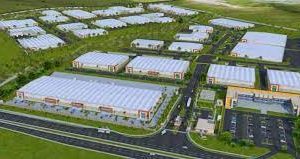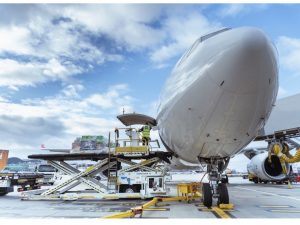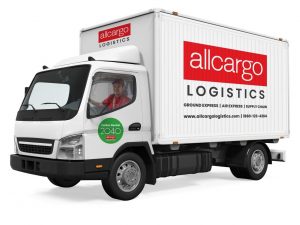The Centre has proposed an ₹850 crore Multi-Modal Logistics Park (MMLP) at Nashik, Maharashtra, under the PM GatiShakti National Master Plan to improve supply chain efficiency and reduce logistics costs. Disclosed by Union Commerce and Industry Minister Piyush Goyal in the Lok Sabha, the project envisions an integrated freight hub with road and rail connectivity, modern storage and material-handling facilities, and support for value-added activities such as packaging, labelling and light assembly.
Read More »Menzies Aviation Achieves Cargo iQ Certification
Menzies Aviation has successfully achieved Cargo iQ certification after completing a comprehensive and rigorous quality audit process. This important accreditation underscores the company’s ongoing commitment to enhancing quality, reliability, and transparency across its global air cargo operations. Cargo iQ is a global industry group comprising more than 60 airlines, freight forwarders, ground handling service providers, trucking companies, and IT solution providers. Its mission is to establish and implement common quality standards for the air cargo industry, using shared business processes, planning methodologies, and performance monitoring to drive continuous improvement. As part of the certification process, Menzies Aviation aligned its worldwide cargo operations with Cargo iQ’s globally recognised Master Operating Plan (MOP). The MOP serves as the industry’s standard framework for end-to-end shipment planning and performance measurement, enabling greater consistency, accountability, and visibility throughout the cargo supply chain.
Read More »‘Powering growth with tech, clean energy and AI’
Nikhil Agarwal, President, CJ Darcl Logistics said, “This year witnessed remarkable resilience from the Indian logistics sector considering the geopolitical complexities, government’s focus on enhanced manufacturing, customers affinity toward environmentally friendly options and more traceable deliveries. Now, as we head into 2026, we anticipate seeing more tangible growth in terms of larger adoption of technology, transition toward cleaner fuel, and integration of AI into supply chain. While 2025 was more about conceptualising AI’s use case, we see its role evolving to drive impactful business decisions in the coming year. With the government’s policies and initiatives such as the development of multimodal logistics parks, dedicated freight corridors, construction of new highways and data from PM Gati Shakti being accessible to private logistics players, we see the entire ecosystem coming together to realise the vision of making India a global manufacturing and trade hub with improved efficiency. At CJ Darcl, we’re committed to working alongside the industry stakeholders to elevate India’s global positioning as a logistics powerhouse.”
Read More »Allcargo Logistics Expands Reach to Cover 100% of India’s PIN Codes
Following the approval of its organisational restructuring plan for the domestic supply chain business—encompassing Express Distribution and Consultative Logistics—Allcargo Logistics Limited has announced a major transformation of its domestic distribution network with the launch of Allcargo Extended Reach (AER). AER is an upgraded and rebranded evolution of the company’s earlier Extra Serviceable Stations (ESS), designed to significantly strengthen nationwide accessibility, service reliability, and market reach. This strategic initiative marks a key milestone in Allcargo Logistics’ vision to deliver faster, more reliable, and geographically comprehensive logistics solutions across India. With the rollout of AER, the company now achieves 100% coverage of available PIN codes nationwide, expanding its mapped network from 21,000 to over 32,000 PIN codes. This expanded footprint is driven by Allcargo’s extensive and granular location mapping, which identifies multiple service clusters within each Government of India (GOI) PIN code. As part of this transformation, the company has also more than doubled its direct serviceable PIN codes—from 4,900 to over 10,000—served directly through Allcargo Distribution Centres. This enhanced direct coverage translates into improved speed, higher service reliability, and greater operational efficiency, while deepening Allcargo’s presence across emerging and underserved markets.
Read More »‘Domestic Cargo Absorbs FDTL Shock, but Schedule Sensitivities Persist’
Balagopal Balachandran, National Head – Air Freight, FEI Cargo said, “While the immediate impact on cargo has been contained, the disruption driven by revised FDTL norms has underlined existing vulnerabilities in domestic logistics, particularly for time-critical cargo flows. During the affected week, shippers and forwarders partially mitigated capacity gaps by shifting volumes to alternate airlines, rail, and road. However, pharmaceuticals , perishables, e-commerce remained exposed, highlighting a schedule driven reliability challenge rather than an absolute capacity deficit. The impact was concentrated on Tier-2 and Tier-3 routes where IndiGo’s frequency dominance is significant. Historically, IndiGo’s domestic capacity utilization has been highest on early morning and late evening flights in comparison to their rest of the day departures. Looking ahead to 2026, the issue is unlikely to evolve into a structural capacity shortfall but will remain a schedule centric challenge. Let us keep a close watch on how the situation unfolds.”
Read More »‘Limited belly capacity deepens domestic cargo volatility’
CK Govil, Chairman and Managing Director, Activair Airfreight said, “The recent surge and subsequent volatility in domestic cargo capacity has been closely linked to passenger fleet availability, with IndiGo playing a disproportionately large role in the domestic market. The ongoing operational disruptions at IndiGo are likely to have a lingering impact well into 2026, particularly if aircraft groundings and induction delays continue. Given IndiGo’s scale, even marginal reductions translate into meaningful capacity constraints for domestic cargo. At present, other domestic airlines do not have adequate belly-hold capacity to fully absorb the displaced volumes. The domestic market remains structurally dependent on passenger aircraft, and the limited presence of dedicated freighters exacerbates the shortfall, especially on high-density trunk routes and time-sensitive sectors. Operationally, this imbalance is expected to increase volatility in cargo movement, force ad-hoc network planning, and place pressure on service reliability. Cargo agents and shippers may face higher costs, tighter cut-off times, and inconsistent uplift, underscoring the need for long-term capacity planning, freighter induction, and policy support to stabilise India’s domestic air cargo ecosystem.”
Read More »‘Belly cargo crunch likely to last through 2026’
Amit Maheshwari, Founder and CEO, Softlink Global said, “IndiGo’s disruptions will keep domestic belly cargo tight well into 2026. When the largest carrier sneezes, the market catches a cold. Other airlines do not have enough spare belly space to fully absorb the spillover, so this is not a short gap but a capacity issue. Add winter fog in North India and you get more cancellations, missed connections, and uneven flows. Operational teams will reroute, cut buffers, and accept lower service reliability, especially on time-critical lanes.”
Read More »‘Bonded cargo, e-commerce may get affected because of capacity crunch’
Dipen Lalsodagar, Deputy Director Sales, Global Aviation Services said, “The 10 per cent capacity reduction mandated by the DGCA for IndiGo is expected in the domestic market. The limited ability to bridge this gap at short notice by other carriers is likely to result in significant capacity constraints. This will impact multiple cargo segments. The e-commerce sector will be particularly affected, with some volumes likely to shift to alternative modes of transport. Additionally, general commodities and international bonded cargo will face disruptions due to the overall squeeze in domestic capacity.”
Read More »‘Flight disruptions squeeze cargo capacity, agents may opt for road’
Sunil Kohli, Managing Director, Rahat Cargo said, “An unprecedented cancellation of flights of IndiGo did considerably impact domestic cargo movement, especially time-bound and temperature sensitive products such as pharma & fresh vegetables, across the country. And consequently such flight disruptions are bound to have its cascading effect towards demand of space on other available carriers which are just a few and thus may not cater to the required supply of space due to limited belly capacity. Resultantly, the shippers may have limited options either to curtail the cargo movement by air or opt for road transport. Hence there is need for robust contingency plans and reduced dependence on a single airline. The market also needs dedicated freighters (like narrow-body ones for Tier II/III cities) to meet the demand effectively. Issues such as airport congestion & inefficient handling also need to be addressed. All stakeholders are expected to optimise the available resources and systems to yield the desired productivity, the space constraints notwithstanding.”
Read More »‘Kerala, Telangana, UP have seen huge domestic cargo & warehousing growth’
Ramanathan Rajamani, CEO of AISATS said, “Our biggest learning from 2025 is that India’s aviation sector has entered a phase where growth is no longer linear. Passenger mobility, cargo volumes, and airline networks expanded at a pace that required not just capacity, but systems, predictability, and discipline. This year made it clear that safety, technology, and a skilled workforce must work together as one integrated operating model. We saw this firsthand across our network, from smooth rollouts in Kochi and Raipur to rising cargo movement in high-potential southern and northern markets. Digital solutions such as our real-time resource allocation platform, mobile-enabled passenger platforms, and cargo digitisation tools proved that technology is now a foundational part of operational resilience. Another key insight is that regional India is becoming central to the aviation map; markets like Kerala, Uttar Pradesh, and Telangana have seen rapid traffic and cargo growth, reflecting a wider economic shift. Above all, 2025 reinforced the value of trust. We earned it through consistent performance, our safety-first culture, and our commitment to building the next generation of aviation infrastructure. It has been a year of learning, confidence-building, and preparing for an even more ambitious 2026.”
Read More » Cargo Breaking News
Cargo Breaking News








